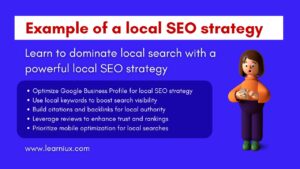In the rapidly evolving world of online retail, e-commerce businesses are constantly looking for ways to stand out in a crowded digital marketplace. Local SEO is an overlooked but highly effective strategy that focuses on optimizing a business’s online presence for location-based searches. For e-commerce companies, integrating local SEO can be a game-changer, helping them attract nearby customers, drive conversions, and build stronger relationships with their audience. This article explores the importance of local SEO for e-commerce, providing practical strategies, insights into its benefits, and a look at emerging trends that could shape its future, all designed to help businesses thrive in their local markets.
Local SEO is the process of optimizing a website to rank higher in search results for queries related to specific geographic locations. Unlike general SEO, which targets broad keywords, local SEO focuses on searches like “buy clothes near me” or “electronics store in Delhi.” For e-commerce businesses, this approach is particularly valuable because it bridges the gap between online shopping and local consumer behavior. Although e-commerce operates in the digital realm, many consumers prefer to interact with businesses that are relevant or feel relevant to their location. Whether it’s fast delivery, in-store pickup options, or simply a sense of familiarity, local SEO helps e-commerce brands effectively tap into these preferences.
The relevance of local SEO for e-commerce lies in its ability to drive targeted traffic. When consumers search for products or services with local intent, they are often more likely to make a purchase. For example, someone searching for “fresh bakery items in Bangalore” is looking for fast delivery or a nearby pickup point. By optimizing for such queries, e-commerce businesses can capture high-intent customers, which increases the likelihood of conversion. Additionally, local SEO helps businesses compete with larger players by focusing on specific regions where they can dominate search results. For example, a small e-commerce store specializing in handmade jewelry can outperform larger brands in searches like “handmade jewelry in Pune” by using local SEO tactics.
One primary benefit of local SEO is increased visibility in local search results. When a business optimizes their website and online profile for local queries, they are more likely to appear in the coveted “local pack” on Google, which shows three businesses relevant to the user’s location. This prime real estate can significantly increase traffic, especially for mobile users, who make up a large portion of local searches. Another benefit is the ability to attract nearby customers who value convenience. E-commerce businesses that offer same-day delivery or click-and-collect services can attract these shoppers, increasing loyalty and repeat purchases. Local SEO also builds trust through customer reviews and ratings, which are often linked to location-based platforms like Google Business Profile. Positive reviews from local customers can increase credibility and influence purchasing decisions.
Beyond visibility and trust, local SEO enables e-commerce businesses to compete effectively in their regions. Large e-commerce giants may dominate national or global searches, but local SEO levels the playing field by allowing smaller businesses to target specific markets. For example, an e-commerce store in Mumbai that sells organic skincare products can focus on ranking for “organic skincare in Mumbai,” building a dedicated customer base. Additionally, local SEO boosts mobile search performance, which is important as more and more consumers shop on their smartphones. Optimizing for mobile-friendly local searches ensures businesses are accessible to shoppers on the go, further increasing their return on investment.
Implementing local SEO for e-commerce involves several practical steps. The most important is setting up and optimizing a Google Business Profile. This free tool allows businesses to manage their online presence on Google Search and Maps, providing customers with essential details like store hours, contact information, and directions. A fully optimized profile with accurate details, high-quality images, and regular updates can significantly improve local rankings. Businesses should also focus on local keyword research, identifying terms that reflect their products and location. Tools like SEMrush or Ahrefs can help you find high-value keywords like “buy laptops in Chennai” or “home decor store in Kolkata.” Including these keywords in product descriptions, blog posts, and landing pages ensures relevance to a local audience.
Creating location-specific content is another powerful strategy. E-commerce businesses can develop landing pages for each city or region they serve, built with local keywords and information. For example, a furniture e-commerce platform can create separate pages for “Modern Furniture in Hyderabad” and “Modern Furniture in Ahmedabad,” each highlighting local delivery options or promotions. Blog content can also reflect local interests, such as gift guides for festivals celebrated in specific regions or tips for using products in the local climate. This not only improves SEO, but also resonates with customers on a personal level, creating a sense of connection.
Customer reviews play a key role in local SEO success. Encouraging satisfied customers to leave reviews on Google or other platforms builds credibility and signals to search engines that the business is trustworthy. Responding to both positive and negative reviews shows engagement and builds a positive brand image. E-commerce businesses can encourage reviews through follow-up emails or loyalty programs, ensuring a steady flow of feedback. Local social media marketing is another avenue to explore. Platforms like Instagram and Facebook allow businesses to target ads to specific locations, promoting products or services to nearby audiences. Collaborating with local influencers can further expand reach, as their followers often trust their recommendations for local businesses.
Optimization for voice search is increasingly important, as more consumers use devices like Alexa or Google Assistant to search for products. Voice searches are conversational and location-specific, such as “Where can I buy shoes near me?” E-commerce businesses should include natural language phrases in their content to capture these questions. Additionally, schema markup, a type of structured data, can enhance local SEO by providing search engines with detailed information about a business’s location, products, and services. This can improve the likelihood of appearing in rich snippets or map results, which can lead to more clicks.
Despite its benefits, local SEO for e-commerce comes with challenges. Managing multiple locations or service areas can be complex, especially for businesses operating in multiple cities. Each location requires unique content, profiles, and optimization efforts, which can strain resources. Balancing local and global SEO strategies is another hurdle, as businesses must ensure that their broader e-commerce goals align with local efforts. Keeping up with search engine algorithm updates and local competition also requires constant attention. To overcome these challenges, businesses can use automation tools like Moz Local to manage listings on the platform or use analytics tools like Google Search Console to monitor performance. Hiring a local SEO expert or agency can also streamline efforts for businesses with limited in-house expertise.
Real-world examples demonstrate the power of local SEO for e-commerce. Consider an e-commerce store in Delhi that specializes in gourmet coffee. By optimizing its Google Business Profile and creating landing pages for nearby cities, the business saw a 30% increase in local orders in six months. Similarly, a fashion e-commerce platform that offers in-store pickup in Bengaluru used local SEO to rank for “women’s clothing in Bengaluru,” which led to a 25% increase in foot traffic to its physical store. These success stories illustrate how targeted strategies can deliver measurable results, from increased sales to stronger customer relationships.
Several tools can facilitate local SEO efforts. Keyword research tools like SEMrush and Ahrefs provide insight into local search trends, helping businesses identify opportunities. Local SEO audit tools like Moz Local or BrightLocal ensure that listings are consistent across platforms, a key factor in ranking. Google Analytics and Search Console provide valuable data on traffic sources, user behavior, and keyword performance, which enables businesses to refine their strategies. When choosing tools, businesses should consider their size and goals. Small businesses can benefit from affordable options like BrightLocal, while larger enterprises can invest in comprehensive platforms like SEMrush.
Looking ahead, local SEO for e-commerce is set to evolve with emerging trends. Hyperlocal targeting, which focuses on very specific neighborhoods or regions, is gaining popularity as consumers seek ultra-convenient shopping options. Geotagging, where businesses tag their content with precise location data, will further increase visibility in local searches. AI-powered search algorithms are also reshaping how results are ranked, requiring businesses to prioritize high-quality, relevant content. Video content is becoming a powerful tool for local SEO, as consumers increasingly engage with video reviews or product demos tied to their location. Augmented reality is another exciting frontier, allowing e-commerce businesses to offer virtual try-ons or store previews that appeal to local shoppers. As consumer behavior shifts toward more personalized and convenient experiences, these trends will shape the future of local SEO.
Local SEO is not only helpful, it’s essential for e-commerce businesses that aim to thrive in competitive markets. By optimizing for local searches, businesses can attract high-intent customers, build trust, and compete effectively with larger brands. Practical strategies like Google Business Profile optimization, local content creation, and review management can yield measurable results. While challenges exist, the right tools and approaches can make local SEO easy and effective. With emerging trends like hyperlocal targeting and AI-powered search, e-commerce businesses that embrace local SEO will be in a better position to capture nearby markets and increase sales. Start implementing these strategies today to connect with local customers and grow your e-commerce presence.





















































